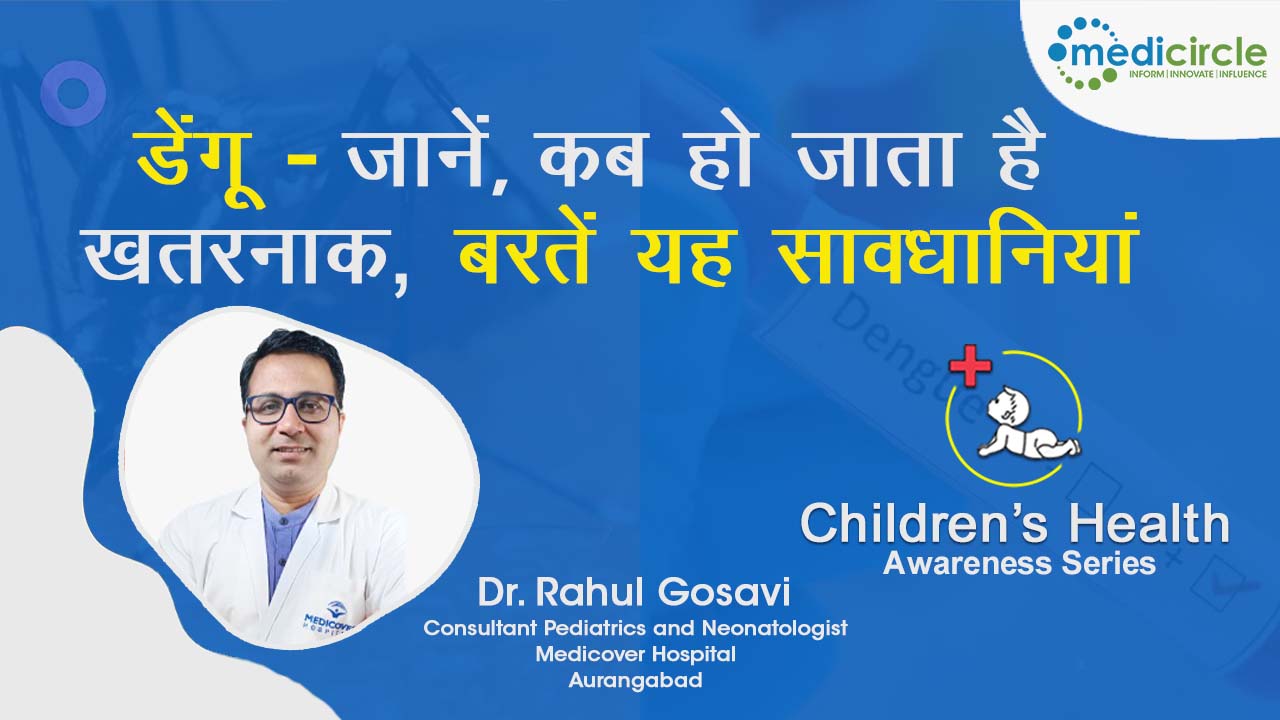Stages of Dengue
Dr. Rahul begins, “Dengue can be divided into three stages –
Stage I (Febrile phase) –
- High-grade fever (2-7 days)
- Body ache
- Myalgia
- Decrease intake
- Dehydration
- Fitts
- Rashes on the body (after 2-7 days as fever comes down)
Stage II (Critical phase) – As the body temperature drops down, the critical phase starts.
- Ascites (accumulation of fluid within the abdomen) – It may cause abdominal pain and swelling.
- Low platelet count
- Low blood pressure
Stage III (Recovery phase) – Patient gets back to normal.
- Increase oral intake
- Increase physical activity
Symptoms of dengue in children
Dengue fever (Uncomplicated dengue)
- Red rashes
- Headache
- High-grade fever
- Retro orbital pain
- Weakness
- Bodyache
- Joint pain
Complicated dengue – Low platelets count, warning signs
- Rashes on the arm
- Stomachache
- Vomiting
Dengue Shock Syndrome (DSS) – Low BP, damage to organ systems like heart, liver, lungs etc.
Warning signs of dengue
- Nose bleeding (epistaxis)
- Bloody vomiting
- Black stools
- Bleeding gums
- Excessive menstrual bleeding
- Black urine
- Extremely fatigue
- Restlessness
- Sudden behavior change
- Drop in oxygen level
- Repeated vomiting (more than 3)
- Severe abdominal pain
- Abdominal Swelling
- Lesser urination
- Increase level of hemoglobin
- Increase in acid level
- Abnormal change in kidney function test and liver function test
Dr. Rahul expresses, “As soon as the symptoms get visible, consult the physician. If the test comes positive for dengue, then
- Maintain hydration, drink plenty of water
- Take your medicines on time as prescribed by your doctor
Once the febrile phase is gone, the critical phase starts. In this phase, look for the warning signs. If you notice any of the above-listed warning signs, rush to the doctor immediately. Maintain your hydration level, and consume sufficient fruits and vegetables.”
Is hospitalization necessary for dengue?
Dr. Rahul emphasizes, “Dengue fever can be easily managed at home. When dengue is getting hemorrhagic, platelets count is decreasing severely (less than 50,000), then only hospitalization is necessary otherwise it can be easily managed at home. Hospitalization might also be required if you notice any of the warning signs.”
Complications from dengue
Dr. Rahul says, “There is no effective treatment plan or medicine designed especially against this. Generally, there are no long-term complications of dengue. Persons who were previously infected with one or more types of dengue virus are at a greater risk for developing severe complications if infected again.”
Precautionary measures
- Use mosquito repellents on skin and clothing
- Use mosquito nets
- Discard items that can collect or retain rainwater or run-off water
- Avoid water stagnation
- Wear long-sleeved shirts, and long pants when outdoors
FAQs
1. Does papaya leaf increase platelet count?
Basically, the body’s natural defense system acts against this. Patients need to maintain the hydration level of the body. Look for the warning signs.
2. Is coconut water beneficial for dengue patients?
Coconut water, lemon water, fresh fruit juices, and soups are helpful. ORS is the key element; it is highly useful in this.
3. Does dengue happen only once?
Dengue can happen more than once.
(Edited by Renu Gupta)

 With the incidence of dengue drastically rising, India is witnessing a serious number of cases. Dengue fever is hemorrhagic and can be fatal, if not treated well in time. As prevention is better than cure, let’s spread awareness about dengue, its symptoms, warning signs, complications, and preventive measures.
With the incidence of dengue drastically rising, India is witnessing a serious number of cases. Dengue fever is hemorrhagic and can be fatal, if not treated well in time. As prevention is better than cure, let’s spread awareness about dengue, its symptoms, warning signs, complications, and preventive measures.









.jpeg)









.jpeg)

.jpeg)












.jpg)